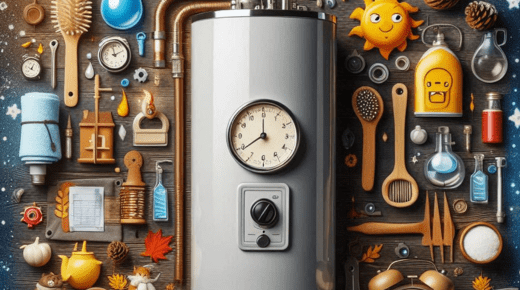As the seasons shift, it’s crucial to ensure your water heater is ready to handle the changes in temperature and usage. I’ve learned that a little maintenance now can save you from a lot of headaches—and cold showers—later.
Whether it’s summer or winter, your water heater needs specific care to keep running efficiently and reliably. For expert guidance, consider reaching out to water heater maintenance specialists who can help ensure your system is prepared for any weather.
In this article, I’ll share essential tips to prepare your water heater for seasonal changes. From simple inspections to more detailed maintenance tasks, these steps will help extend the life of your unit and keep your home comfortable year-round. Let’s dive in and make sure your water heater is up to the challenge of the changing seasons.
Assessing Your Water Heater’s Condition
Seasonal changes can take a toll on your water heater. Regular assessments help identify issues before they escalate. Here’s how to evaluate your water heater’s condition.
Checking for Leaks
Leaks can cause significant damage and reduced efficiency. To check for leaks, inspect the area around the water heater for pooling water. Examine the plumbing connections, temperature and pressure relief valve, and the drain valve. If you find any moisture or dripping, replace the faulty parts promptly to prevent further issues.
Inspecting for Rust and Corrosion
Rust and corrosion can indicate aging or damaged components. Check the exterior of the water heater and its plumbing connections for any rust spots or corrosion. Pay special attention to the tank, the pipes leading in and out, and the connections at the top and bottom of the unit. If you notice significant rust or corrosion, it might be time to consider replacing the water heater to avoid leaks or ruptures.
Winter Preparation Tips
Winter weather can put extra strain on your water heater. Preparing it adequately for the cold months ensures its efficiency and longevity.
Insulating Your Water Heater
Insulating helps maintain the water temperature. Using a water heater blanket specifically designed for your model can reduce standby heat loss by up to 25%. Wrap the blanket tightly around the tank, securing it with tape or straps, while leaving the thermostat and burner access panels uncovered.
Draining the Tank
Sediment buildup can reduce efficiency and damage the tank. Draining the tank at least once a year removes accumulated sediment. Start by turning off the water supply and power to the heater. Attach a hose to the drain valve at the tank’s base, then direct it to a floor drain or suitable disposal area. Open the valve and let the tank fully drain. Close the valve, remove the hose, and restore the water supply and power.
Setting the Temperature
Setting the right temperature ensures efficient functioning. The Department of Energy recommends setting the thermostat to 120°F (49°C) during winter. This temperature prevents scalding, reduces energy consumption, and keeps the heater running efficiently.Consult your heater’s manual for instructions on adjusting the thermostat.
Summer Preparation Tips
Preparing your water heater for summer ensures it operates efficiently even during warmer months. Focusing on key maintenance tasks can extend its lifespan and improve performance.
Adjusting the Thermostat
Lowering the thermostat helps save energy and money in summer. Set the temperature to 120°F to avoid overheating the water, which is unnecessary during hotter months. This reduction not only conserves energy but also prevents scalding incidents, making it safer for everyone at home.
Cleaning the Ventilation System
Maintaining a clean ventilation system is crucial for your water heater’s efficiency. Inspect the vents for any blockages or debris that might restrict airflow. Use a vacuum or brush to clear out any dust, dirt, or other obstructive materials. Keeping the ventilation system clean ensures that the water heater runs smoothly and prevents potential overheating issues.
Maintenance Best Practices
Consistent maintenance is key to extending the lifespan of your water heater. Here are some essential practices to ensure your unit operates effectively year-round.
Scheduling Professional Inspections
Professional inspections help identify potential issues early. I recommend having a qualified technician inspect your water heater at least once a year. They’ll check for rust, leaks, and sediment buildup. Inspections during seasonal changes can prevent unexpected breakdowns and costly repairs by ensuring each component works efficiently.
Regular Flushing of the Tank
Flushing the tank removes sediment that accumulates over time. Annually flushing your water heater boosts efficiency and prolongs its life. To do this, attach a hose to the drain valve and let the water flow out until it runs clear. Ensure the tank is completely drained to remove all debris. Regular tank maintenance prevents performance issues and keeps the water heater running smoothly.
Common Mistakes to Avoid
Avoiding common mistakes can ensure your water heater operates efficiently throughout the year.
Ignoring Minor Issues
Many people overlook minor issues with their water heaters, only to face significant problems later. Small leaks, unusual noises, or inconsistent water temperatures can be early signs of larger issues. Addressing these minor issues promptly can save both time and money.
Overlooking Regular Maintenance
Failure to perform regular maintenance often leads to reduced efficiency and costly repairs. Neglecting tasks such as flushing the tank, checking for rust, and inspecting the anode rod can cause sediment buildup and corrosion. Regular maintenance, including annual professional inspections, helps keep the water heater in optimal condition.




